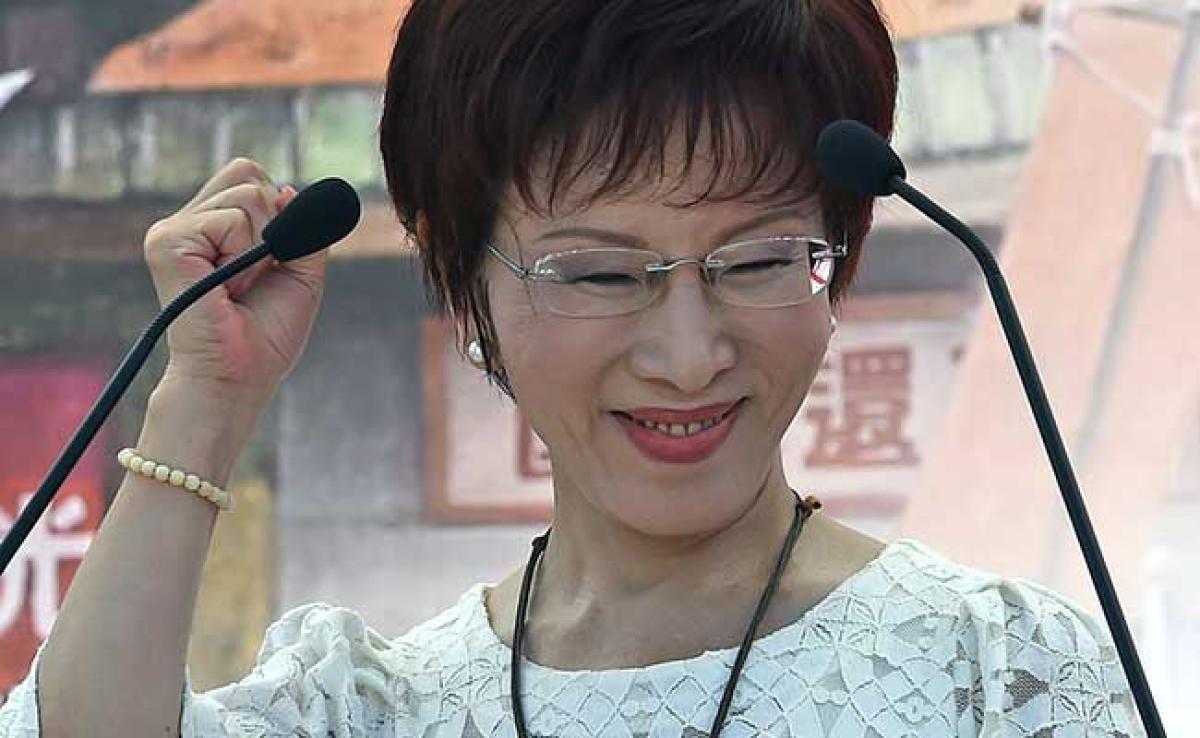Live
- Govt plans to establish offshore Johns Hopkins University Campus in India
- Goa Aces clinch Indian Racing League title
- Study finds how hormone therapy can reshape the skeleton
- High-street fashion players looking at India for manufacturing: Report
- Shreyas Iyer to lead Mumbai as Prithvi Shaw returns for Syed Mushtaq Ali Trophy
- 'Failed to resolve crisis': NPP withdraws support from BJP govt in Manipur
- Chennai: Actress Kasturi Remanded in Custody Until 29th of This Month
- Aaqib Javed likely to become Pakistan's new white-ball head coach
- BJP panel to draft poll charge sheet against AAP govt in Delhi
- Allu Arjun Thanks Fans in Patna, Teases 'Pushpa 2' Release
Just In

x
Highlights
Known as \'xiao-la-jiao\' or \'little hot pepper\' for her straight-talking style, unlikely presidential hopeful Hung Hsiu-chu encapsulates the crisis facing Taiwan\'s ruling Kuomintang (KMT) and the sharp divisions in the island\'s politics.
Known as 'xiao-la-jiao' or 'little hot pepper' for her straight-talking style, unlikely presidential hopeful Hung Hsiu-chu encapsulates the crisis facing Taiwan's ruling Kuomintang (KMT) and the sharp divisions in the island's politics.
.jpg)
Hung's conservative pro-China views are at odds with public sentiment and have even alienated some in her own party.
However, her nomination for the leadership is still expected to be endorsed by the KMT as the party's traditional big hitters opt to stay on the sidelines of what is expected to be an electoral defeat.
The Beijing-friendly party is tipped to lose January's leadership vote as it battles public fears over increased Chinese influence and a stagnating economy.
If confirmed, Hung's candidacy would set up a showdown with seasoned operator Tsai Ing-wen, chairwoman of the Beijing-sceptic main opposition Democratic Progressive Party (DPP), with Taiwan's China policy at the heart of the duel.
Though independent candidates will also enter the race, observers say the two women will be the frontrunners.
Hung, 67, who is currently deputy parliamentary speaker, had her June nomination backed by the KMT's standing committee and it looks likely to be passed at its congress on July 19 in the absence of other candidates.
'Now that this opportunity has unexpectedly come her way Hung is going for it. But she is not a polished performer or someone with a detailed policy platform,' said Jonathan Sullivan, associate professor at the University of Nottingham's China Policy Institute.
'Her nomination has many KMT politicians worried, either because they dislike her political views or view her as an impending disaster.'
She has already been chastised by the KMT leadership over confusing statements on her pro-unification 'one China' strategy, which has also alarmed moderates in the party.
Yet the party has little choice as it struggles to find a fresh face to lead.
'The other (possible) candidates belong to the old guard and that would have been even less credible,' says Jean-Pierre Cabestan, professor of political science at Hong Kong's Baptist University.
'There's also the gender issue, the fact that it's a woman. Having two women fighting for this position is unprecedented.'
Political divide
Hung not only illustrates the split within the KMT, where pro-China voices clash with the more moderate camp, but also wider political polarisation over approaches to Beijing.
Taiwan split from China in 1949 after a civil war and is self-ruling, but Beijing still sees the island as part of its territory awaiting reunification by force if necessary.
Since current KMT president Ma Ying-jeou came to power in 2008 ties with China have warmed, leading to trade deals and a tourism boom.
But there is growing public unease over closer relations which many voters feel have benefited big business rather than ordinary citizens.
Discontent led to rallies last year and a student-led occupation of the island's parliament over a trade deal with China that critics said had been signed in secret.
Concern over China policy was also a major factor in the resounding defeat of the KMT at local elections in November, the party's worst ever loss.
Status quo
The DPP's Tsai says she will seek public consensus but has pledged to maintain the 'status quo' with Beijing if she were elected a policy aimed at soothing nerves in the United States, Taiwan's biggest ally, and an acknowledgement of the need to cooperate with China economically.
Under previous DPP president Chen Shui-bian, a staunch advocate of independence who led the island from 2000 to 2008, relations with the mainland reached their frostiest.
'Tsai is not going to rock the boat the status quo is easy to understand,' says Cabestan.
'And in a way that has forced Hung and the KMT to become more rightist than they would have liked. The centrist position is already occupied by Tsai, so how do you differentiate yourself?'
Hung's policy adviser Chang Ya-chung admitted she needed to 'work harder to communicate with the public' but defended her China policy, which includes seeking a peace agreement with Beijing.
However some say she will have to rein in her views if she is to stand a chance in the presidential race.
'Her clear-cut and direct speaking style was credited in the beginning, but then she made some verbal mistakes on mainland policy,' said George Tsai of Taipei's Chinese Culture University.
'She might have to become prudent while speaking on such sensitive issues, but then she may lose what originally attracted voters. This is her catch-22 situation.'

Next Story
More Stories
ADVERTISEMENT
© 2024 Hyderabad Media House Limited/The Hans India. All rights reserved. Powered by hocalwire.com







